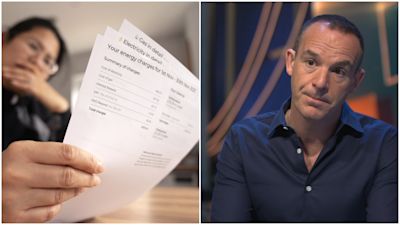Martin Lewis explains how UK petrol and supermarket prices could go up after Russia invades Ukraine

ITV News correspondent Rachel Younger examines how the war in Ukraine could impact the cost of living crisis
Russia launching an invasion in Ukraine could result in higher energy bills for swathes of consumers across the UK and will likely deepen the cost of living crisis griping the country.
Consumers were already due to pay almost £700 more per year to power their homes from April because of the new energy price cap.
But wholesale gas prices could surge even further in the long-term if Russia hits back at Western sanctions by cutting off gas supplies to European countries.
Money Saving Expert Martin Lewis explains how British households will be impacted by the escalating Ukraine-Russia conflict
And it is not only energy costs which could rise.
Experts have also warned that petrol and food prices could increase as a result of the conflict, which has seen some 40 people die so far.
Money Saving Expert Martin Lewis has provided a breakdown of the different ways events in Eastern Europe could affect you.
Listen to our Ukraine Q&A podcast:
How will the crisis affect British consumers?
Energy
Because Russia is a huge supplier of gas, which the UK also uses for electricity, the conflict is likely to see a "huge increase in wholesale gas prices", Mr Lewis said.
On Thursday, the price of British gas for next-day delivery jumped 53% to 326p per therm as the Russian incursion triggered concerns of disruption to global energy supplies.
"We have seen the spike today. The prices that energy firms pay has rocketed. The big question is how long that will last," the money saving expert added.
He says the economic uncertainty faced in Ukraine will be replicated around the world, which could bring down productivity, potentially causing a "substantial economic impact" if the conflict is prolonged or escalates.
Even before the Ukraine crisis escalated, average UK energy bills were expected to increase by more than 50% in April.
Someone with typical energy use is currently paying £1,277 a year. From April 1, this will increase 54% to £1,971 per year, when the energy price cap increases.
From October 1, the prices will be based on the wholesale rates - the prices that energy companies pay - which are calculated from the beginning of February to the end of July.
Before Thursday, experts expected the price to rise about 20% by this date, taking people into the £2,100 - £2,200 range.
It is difficult to predict how long the spike in energy prices seen today will last.
But Mr Lewis says that if the prices "continue at the level it is right now they will go up a lot" by the autumn.
Oil
Oil prices have increased past £74 a barrel to hit their highest level for more than seven years.
Oil powers ships and lorries used to deliver goods.
So the price of goods, including food, will likely rise as suppliers pass on the increased cost of transportation resulting from the surging cost of oil, Mr Lewis said.
"Oil going up increases the prices that suppliers pay, increases the cost of delivering goods to us and is hugely inflating in the price of food and many of the goods we always buy.
"So, if this lasts a long time, most things will go up in price."
Experts fear that Vladimir Putin may now choose to cut gas supplies to Europe in response to Western economic sanctions and after Germany blocked the progress of Russia's Nord Stream 2 gas pipeline.
Petrol
On Thursday, the price of Brent crude oil had jumped by 5.6% by a little after 7am UK time to 102.30 dollars per barrel, hitting its highest point since 2014.
"Already at the petrol pumps we are seeing prices at new records," Mr Lewis said.
Experts are warning UK drivers could soon see fuel prices hit £1.55 a litre - bringing the cost of a full tank of gas to an estimated £85 - as crude oil prices immediately spiked in reaction to the crisis.
Motorists are being warned to expect a surge in fuel prices “any time soon” as oil prices surged.
Inflation
Ukraine is a major supplier of wheat and corn, with economists warning the cost-of-living crisis in the UK could be exacerbated with inflation rising well beyond current predictions of around 7% later this year.
Inflation is the rate at which prices are rising - and prices have been going up so quickly that average pay is not keeping up. It means people's money is not going as far.
Samuel Tombs, chief UK economist at Pantheon Macroeconomics, said if the jumps in oil, gas and electricity products on Thursday are sustained, it could push inflation to 8.2% in April. It would only fall back to 6.5% by the end of the year, he added. Inflation hit 5.5% in January and the Bank of England believes it will peak at more than 7% in April when huge 50% increases in domestic energy bills when the new price cap hits.